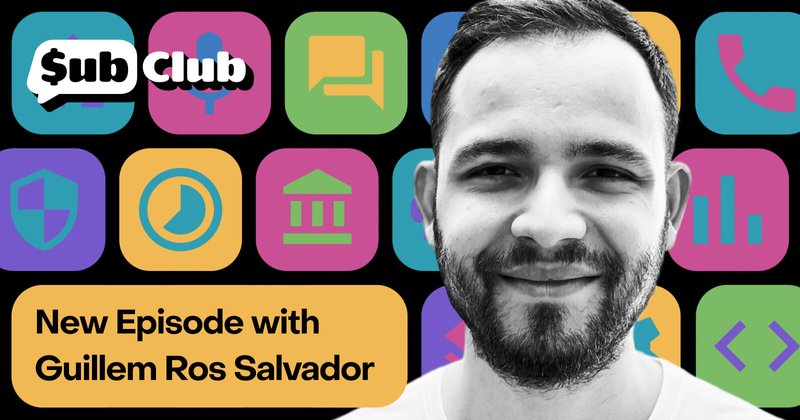How Hevy tipped the scales: Insights on reaching two million downloads with Guillem Ros
Guillem discusses the app's rapid growth without paid marketing, the power of community, and their unconventional pricing strategy.

On this episode: We talk with Guillem about how Hevy got traction early on, growing without paid marketing, and why you might not want to raise your price, even if customers would pay more.
How do you get to two million downloads with just $15k in ad spend?
As CEO and co-founder of workout planning and tracking app Hevy, Guillem Ros knows that you don’t necessarily need paid marketing for growth to snowball.
In this episode of the Sub Club podcast, Guillem breaks down how “the Strava of Weightlifting” went from single-digit downloads to over two million in four years. Most impressively, half of that growth happened in just five months.
The birth of Hevy: A community-focused weightlifting app
But his journey to success started long before Hevy: An app builder since the age of 16, starting with mobile gaming, Guillem’s time as a triathlete and Strava user sparked the idea of a similar fitness app based with a heavier focus on community. As a product manager for fitness app 8fit, he learned more lessons that he later channeled into Hevy.
Guillem and his co-founder built Hevy with a firm focus on product, while marketing took a backseat. That’s how they managed to ship 1.0 so rapidly. Creating a killer product enabled organic growth based on word of mouth and App Store and Google Play algorithms. It may come as a surprise to longtime listeners that — in contrast to the advice of Appfigure CEO and founder Ariel Michaeli — the Hevy team did very little App Store Optimization (ASO) in the early stages.
By bootstrapping, Hevy could pursue growth and profitability without external venture capitalist (VC) pressure. Their next tactic was tackling low lifetime value (LTV) due to low subscription prices by doubling down on virality. Guillem points out that he and his partner quickly realized that — despite charging less than competitors — their product was superior.
Explore bootstrapping vs VC funding in our guide to mobile app funding >>
One of its most important facets, which continues to drive organic growth, was the rise of the kind of community that is lacking in the fitness app space. Guillem explains that they found different users following new users who were also following each other, creating one of the biggest pulls for people to come back for more: the social element.
Pricing strategy: Keeping costs low and profit high
By focusing on product and keeping acquisition costs lower than competitors, Hevy is able to benefit from velocity that’s above water — keeping the company sustainably profitable, with a lot more on the horizon. Guillem highlights that Hevy has a very long vision: to get to 100 million users. Given that half of its two million user base joined in the last five months, this might not be as difficult as it looks. Guillem is under no illusion about the difference in market size between rising star Hevy and giants like Facebook and Twitter, but recognizes that there’s plenty more room for growth.
On the podcast, Guillem talks about how Hevy gained its early traction, the key to growth without paid marketing, and why you might not want to raise your price — even if customers would pay more.
You might also like
- Blog post
“A big market is great only if you can take a substantial share of it” — Patrick Falzon, The App Shop
On the podcast: estimating the revenue potential of an app, crafting an exit strategy, and why LTV is such a terrible metric.
- Blog post
Effective testing strategies for low-traffic apps
Is A/B testing off the table? Let’s rethink experimentation.
- Blog post
The essential guide to paywalls for subscription apps
Why your paywall may be costing you subscribers (and how to fix it)

